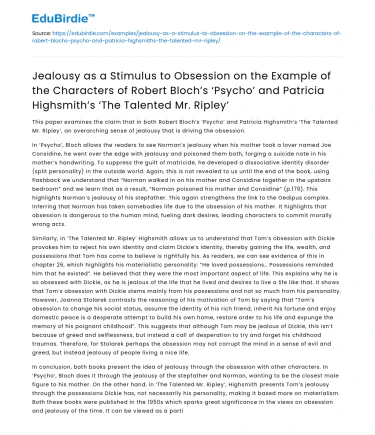This paper examines the claim that in both Robert Bloch’s ‘Psycho’ and Patricia Highsmith’s ‘The Talented Mr. Ripley’, an overarching sense of jealousy that is driving the obsession.
In ‘Psycho’, Bloch allows the readers to see Norman’s jealousy when his mother took a lover named Joe Considine, he went over the edge with jealousy and poisoned them both, forging a suicide note in his mother’s handwriting. To suppress the guilt of matricide, he developed a dissociative identity disorder (split personality) in the outside world. Again, this is not revealed to us until the end of the book, using flashback we understand that “Norman walked in on his mother and Considine together in the upstairs bedroom” and we learn that as a result, “Norman poisoned his mother and Considine” (p.179). This highlights Norman’s jealousy of his stepfather. This again strengthens the link to the Oedipus complex. Inferring that Norman has taken somebodies life due to the obsession of his mother. It highlights that obsession is dangerous to the human mind, fueling dark desires, leading characters to commit morally wrong acts.
Save your time!
We can take care of your essay
- Proper editing and formatting
- Free revision, title page, and bibliography
- Flexible prices and money-back guarantee
Similarly, in ‘The Talented Mr. Ripley’ Highsmith allows us to understand that Tom’s obsession with Dickie provokes him to reject his own identity and claim Dickie’s identity, thereby gaining the life, wealth, and possessions that Tom has come to believe is rightfully his. As readers, we can see evidence of this in chapter 26, which highlights his materialistic personality: “He loved possessions… Possessions reminded him that he existed”. He believed that they were the most important aspect of life. This explains why he is so obsessed with Dickie, as he is jealous of the life that he lived and desires to live a life like that. It shows that Tom’s obsession with Dickie stems mainly from his possessions and not so much from his personality. However, Joanna Stolarek contrasts the reasoning of his motivation of Tom by saying that “Tom’s obsession to change his social status, assume the identity of his rich friend, inherit his fortune and enjoy domestic peace is a desperate attempt to build his own home, restore order to his life and expunge the memory of his poignant childhood”. This suggests that although Tom may be jealous of Dickie, this isn’t because of greed and selflessness, but instead a call of desperation to try and forget his childhood traumas. Therefore, for Stolarek perhaps the obsession may not corrupt the mind in a sense of evil and greed, but instead jealousy of people living a nice life.
In conclusion, both books present the idea of jealousy through the obsession with other characters. In ‘Psycho’, Bloch does it through the jealousy of the stepfather and Norman, wanting to be the closest male figure to his mother. On the other hand, in ‘The Talented Mr. Ripley’, Highsmith presents Tom’s jealousy through the possessions Dickie has, not necessarily his personality, making it based more on materialism. Both these books were published in the 1950s which sparks great significance in the views on obsession and jealousy of the time. It can be viewed as a particularly jealous time, it was the period after World War II, and people were desiring more than what is achievable, which can link to the American Dream. Therefore, having an audience of the same time, they would understand how both Norman and Tom are morally wrong, and how jealousy has shaped their obsession with Norman’s mother and Dickie. This infers that jealousy was the catalyst for the obsession, leading to the corruption in the characters' minds. Thus, suggesting that obsession is not the sole reasoning behind someone’s sanity.






 Stuck on your essay?
Stuck on your essay?

